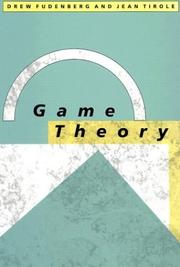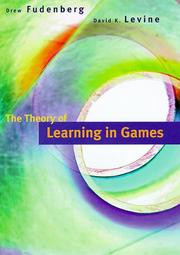| Listing 1 - 9 of 9 |
Sort by
|

ISBN: 9780262016148 0262016141 0262061414 9780262061414 Year: 1991 Publisher: Cambridge : The MIT Press,
Abstract | Keywords | Export | Availability | Bookmark
 Loading...
Loading...Choose an application
- Reference Manager
- EndNote
- RefWorks (Direct export to RefWorks)
Digital artifacts from iPads to databases pervade our lives, and the design decisions that shape them affect how we think, act, communicate, and understand the world. But the pace of change has been so rapid that technical innovation is outstripping design. Interactors are often mystified and frustrated by their enticing but confusing new devices; meanwhile, product design teams struggle to articulate shared and enduring design goals. With Inventing the Medium, Janet Murray provides a unified vocabulary and a common methodology for the design of digital objects and environments. It will be an essential guide for both students and practitioners in this evolving field. Murray explains that innovative interaction designers should think of all objects made with bits--whether games or Web pages, robots or the latest killer apps--as belonging to a single new medium: the digital medium. Designers can speed the process of useful and lasting innovation by focusing on the collective cultural task of inventing this new medium. Exploring strategies for maximizing the expressive power of digital artifacts, Murray identifies and examines four representational affordances of digital environments that provide the core palette for designers across applications: computational procedures, user participation, navigable space, and encyclopedic capacity. Each chapter includes a set of Design Explorations--creative exercises for students and thought experiments for practitioners--that allow readers to apply the ideas in the chapter to particular design problems. Inventing the Medium also provides more than 200 illustrations of specific design strategies drawn from multiple genres and platforms and a glossary of design concepts.
Human-computer interaction --- Digital media --- Social media --- Intercultural communication --- Design --- Human-computer interaction. --- Intercultural communication. --- Interaction homme-machine (Informatique) --- Communication interculturelle --- Design. --- Médias numériques --- Conception --- Médias numériques --- #SBIB:309H1720 --- Cross-cultural communication --- Communication --- Culture --- Cross-cultural orientation --- Cultural competence --- Multilingual communication --- Technical assistance --- User-generated media --- User-generated content --- Electronic media --- New media (Digital media) --- Mass media --- Digital communications --- Online journalism --- Computer-human interaction --- Human factors in computing systems --- Interaction, Human-computer --- Human engineering --- User-centered system design --- User interfaces (Computer systems) --- Informatiekunde, informatie management --- Anthropological aspects --- Digital media - Design --- Social media - Design --- Economics, Mathematical --- Game theory --- mathematische modellen, toegepast op economie --- speltheorieën --- 000.1 --- 518.5 --- 330.105 --- Economics --- Mathematical economics --- Econometrics --- Mathematics --- 330.105 Wiskundige economie. Wiskundige methoden in de economie --- Wiskundige economie. Wiskundige methoden in de economie --- Games, Theory of --- Theory of games --- Mathematical models --- Algemene werken --- Operationeel onderzoek. Speltheorie --- Methodology --- 305.6 --- AA / International- internationaal --- Risicotheorie, speltheorie. Risicokapitaal. Beslissingsmodellen --- Théorie des jeux. --- Mathématiques économiques. --- Game theory. --- Economics, Mathematical. --- Operational research. Game theory --- Théorie des jeux --- Mathématiques économiques --- Mathématiques économiques.

ISBN: 3718602792 9783718602797 Year: 1990 Volume: 3 Publisher: Chur: Harwood,
Abstract | Keywords | Export | Availability | Bookmark
 Loading...
Loading...Choose an application
- Reference Manager
- EndNote
- RefWorks (Direct export to RefWorks)
Oligopolies --- Mathematical models --- -Economic concentration --- Monopolies, Partial --- Partial monopolies --- -Site, location, place of business --- -658.112 Site, location, place of business --- 658.112 --- 658.112 Site, location, place of business --- Site, location, place of business --- Mathematical models. --- Oligopolies - Mathematical models
Digital
Abstract | Keywords | Export | Availability | Bookmark
 Loading...
Loading...Choose an application
- Reference Manager
- EndNote
- RefWorks (Direct export to RefWorks)

ISBN: 0262061945 9780262061940 Year: 1999 Volume: 2 Publisher: Cambridge (Mass.) : MIT press,
Abstract | Keywords | Export | Availability | Bookmark
 Loading...
Loading...Choose an application
- Reference Manager
- EndNote
- RefWorks (Direct export to RefWorks)
Game theory. --- Théorie des jeux --- Théorie des jeux --- Operational research. Game theory --- Game theory --- Game Theory. --- Game Theory
Book
ISBN: 1282440985 9786612440984 9812818472 9789812818478 9789812818461 9812818464 9781282440982 6612440988 Year: 2009 Publisher: Singapore ; Hackensack, NJ : World Scientific,
Abstract | Keywords | Export | Availability | Bookmark
 Loading...
Loading...Choose an application
- Reference Manager
- EndNote
- RefWorks (Direct export to RefWorks)
This book brings together the joint work of Drew Fudenberg and David Levine (through 2008) on the closely connected topics of repeated games and reputation effects, along with related papers on more general issues in game theory and dynamic games. The unified presentation highlights the recurring themes of their work.
Game theory. --- Games, Theory of --- Theory of games --- Mathematical models --- Mathematics --- Game theory
Book
Year: 1991 Publisher: Louvain-la-Neuve: UCL. Center for operations research and econometrics,
Abstract | Keywords | Export | Availability | Bookmark
 Loading...
Loading...Choose an application
- Reference Manager
- EndNote
- RefWorks (Direct export to RefWorks)
Digital
Year: 2009 Publisher: Cambridge, Mass National Bureau of Economic Research
Abstract | Keywords | Export | Availability | Bookmark
 Loading...
Loading...Choose an application
- Reference Manager
- EndNote
- RefWorks (Direct export to RefWorks)
The foundations of incomplete contracts have been questioned using or extending the subgame perfect implementation approach of Moore and Repullo (1988). We consider the robustness of subgame perfect implementation to the introduction of small amounts of asymmetric information. We show that Moore- Repullo mechanisms may not yield (even approximately) truthful revelation in pure or totally mixed strategies as the amount of asymmetric information goes to zero. Moreover, we argue that a wide class of extensive-form mechanisms are subject to this fragility.
Book
Year: 2003 Publisher: Cambridge, Mass. National Bureau of Economic Research
Abstract | Keywords | Export | Availability | Bookmark
 Loading...
Loading...Choose an application
- Reference Manager
- EndNote
- RefWorks (Direct export to RefWorks)
This paper studies whether agents must agglomerate at a single location in a class of models of two-sided interaction. In these models there is an increasing returns effect that favors agglomeration, but also a crowding or market-impact effect that makes agents prefer to be in a market with fewer agents of their own type. We show that such models do not tip in the way the term is commonly used. Instead, they have a broad plateau of equilibria with two active markets, and tipping occurs only when one market is below a critical size threshold. Our assumptions are fairly weak, and are satisfied in Krugman's [1991b] model of labor market pooling, a heterogeneous-agent version of Pagano's [1989] asset market model, and Ellison, Fudenberg and Mobius's [2002] model of competing auctions.
Book
Year: 2009 Publisher: Cambridge, Mass. National Bureau of Economic Research
Abstract | Keywords | Export | Availability | Bookmark
 Loading...
Loading...Choose an application
- Reference Manager
- EndNote
- RefWorks (Direct export to RefWorks)
The foundations of incomplete contracts have been questioned using or extending the subgame perfect implementation approach of Moore and Repullo (1988). We consider the robustness of subgame perfect implementation to the introduction of small amounts of asymmetric information. We show that Moore- Repullo mechanisms may not yield (even approximately) truthful revelation in pure or totally mixed strategies as the amount of asymmetric information goes to zero. Moreover, we argue that a wide class of extensive-form mechanisms are subject to this fragility.
| Listing 1 - 9 of 9 |
Sort by
|

 Search
Search Feedback
Feedback About UniCat
About UniCat  Help
Help News
News